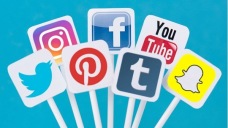‘Flimsy’ evidence for social media worsening adult mental health
Researchers investigated the link between social media use and depression in adults, including older adults.
They found that the use of some social media, but not all, has associations with an increased risk of depressive symptoms.
Alongside expert commentators, the team asks for caution when interpreting the results due to study limitations and uncertainty around causation.
The use of social media has correlations with reduced well-being and increased anxiety and depression among adolescents and young adultsTrusted Source.
One reviewTrusted Source highlighted a study that found using the internet to communicate and play games for more than 4 hours a day predicts depressive symptoms 1 year later. The research also found that depressive symptoms predict increased internet use and decreased participation in nonscreen activities.
Another study involving 990 participants in the United States found a link between social media use and the development of depression. However, preexisting depression did not predict social media use.
However, how accurate these studies are may be questionable because many of them rely on self-reported social media use. A reviewTrusted Source of 47 studies investigating the accuracy of self-reported digital media use raised a concern that self-reported measurements rarely correlate with logged measurements.
Furthermore, studies often do not include adults in their samples, so the effects of social media on older age groups are relatively unknown.
Lastly, whether there is a causal relationship between social media use and depression — and which comes first — is still unknown.
Recently, researchers conducted a survey study investigating the link between social media use and the development of depressive symptoms.
The results suggest certain social media use preceded the worsening of depressive outcomes. The findings appear inJAMA Network OpenTrusted Source.
However, some experts doubt the extent to which these findings can be interpreted.
Surveys
The researchers analyzed results from survey data taken between May 2020 and May 2021 from individuals aged 18 years and above. The survey sample included quotas for sex, age, and race and ethnicity from each of the 50 states in the U.S. to ensure it was representative of the country’s population.
Survey questions included the nine-item Patient Health Questionnaire (PHQ-9) to assess for depressive symptoms. Questions examined whether participants had “little interest or pleasure in doing things” and whether they were “feeling down, depressed, or hopeless” on a four-point scale.
The researchers also queried participants on:
their use of social media, such as Facebook, Instagram, and TikTok
whether they consumed any sources of COVID-19-related news in the last 24 hours
the number of social supports they have available to discuss problems
the number of face-to-face meetings they had with nonhousehold members in the previous 24 hours
For the data analysis, the team included participants who had filled out the surveys at least twice and had an initial PHQ-9 score of less than 5, indicating less than mild depression.
Overall, 5,395 people completed two surveys. Their average age was 55.8 years old, while 65.7% were female, 4.7% Hispanic, 10.6% Black, and 76.3% white.
From their analyses, the researchers noted that Snapchat, Facebook, and TikTok use in the first survey had associations with a significantly greater risk of an increase in self-reported depressive symptoms.
They also noted that COVID-19-related news participants consumed in the last 24 hours alongside the number of social supports and daily face-to-face interactions only impacted results linked to Snapchat.
While TikTok and Snapchat use had correlations with depressive symptoms among those aged 35 years and older, but not those younger than 35, Facebook use had associations with depressive symptoms among those under 35, but not those older than 35
